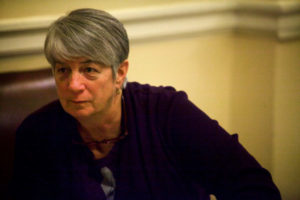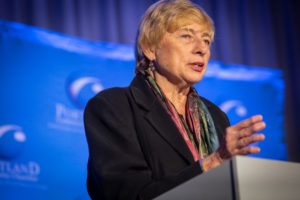By: Valerie Kazarian, Staff Writer
The four candidates running governor in Maine were asked for their opinions on offering free universal tuition to college students. Governors in each state influence, either by proposing or by vetoing proposals, the educational policies within each state. All four gubernatorial candidates were asked for comment and three responded, including Alan Caron (I), Terry Hayes (I) and Janet Mills (D). Shawn Moody (R) did not respond to several requests for comment.

Alan Caron, 67, is a native of Lewiston and running as an Independent. He has a long and diverse background as a community organizer in the state, has earned a master’s degree from Harvard’s Kennedy School of Public Policy and is, according to the Portland Press Herald, considered the go-to political strategist in southern Maine. Caron has a proposed education policy that centers on free public education.
“My goal is to move us toward expanding free public education from preschool to two years of post-high school training and college,” he said in an email. “We can do that by providing no-interest loans to student on the condition that they stay in Maine after graduation and help us build the future.”
Also running as an Independent is Theresa “Terry” Hayes, 60, who was born in Portland and raised in the city’s Stroudwater neighborhood. She had a challenging childhood beginning when her mother was placed in Augusta Mental Health Institute when Hayes was eight years old. When she was eleven, her father was killed in an accident and she was, along with her five siblings, raised by family members.
Knowing that she wanted to go to college, Hayes earned the tuition needed to pay tuition to the McAuley School in Portland and through Bowdoin College. She worked in public schools in adult education and volunteered as a guardian ad litem (GAL). According to Maine’s government web page, “A GAL is a person appointed by the court to gather information and prepare recommendations concerning children involved in some family matters and child protection cases. The GAL’s job is to help the court determine what is in the best interest of the child.”
Hayes has served on the local school board in Bucksfield and served in the state legislature including time as the Assistant Minority Leader. Since 2015 Hayes has served as Maine’s State Treasurer.

“Free tuition is a misnomer (sic),” said Hayes in an email. “I’m not in favor of universal free college tuition.” Instead of free tuition, Hayes said that she would rather lower college costs and debt.
“For example,” she says, “we should not be providing remediation at the college level when it is most expensive. Our adult education programs are a better, more affordable source for this work with learners.” She said, “The institution of higher learning should be required to provide every enrolled student borrower a disclosure of the likely costs of the degree program the borrower is participating in.” She also supports the Opportunity Maine tax credit for Maine graduates. This is a tax refund from the State of Maine for some or all of the student loan payments a graduate makes each year. There are a number of conditions that apply.

Janet Mills, 70, is a native of Farmington and is running as the Democratic candidate. Mills graduated from Farmington High School and went on to the University of Massachusetts Boston where she earned her B.A. She returned to Maine to earn her J.D. degree from the University of Maine School of Law where she was the editor of the Maine Law Review. Mills has served as the Assistant Attorney General and District Attorney for Androscoggin, Franklin and Oxford counties and was the first woman district attorney in New England. Her experience includes serving in the Maine State Legislature and an unsuccessful run for U. S. Congress in 1994. In 1994 Mills was elected to the board of directors of the Maine Women’s Lobby.
“I believe every student who is eligible to attend a public university or community college should be able to do so without having to amass a mountain of debt,” Mills said in an email. “Maine has worked hard to control costs but there is more we must do to make higher education less expensive at the outset – like expanding early college programs and providing support for students to complete programs on time.” She said she supports programs existing in Maine including expansion of the Maine State Grant program and other scholarship programs, internships and apprenticeships with the goal of avoiding debt. “I am open to all ideas for making college affordable while maintaining excellent quality at all level of the system,” Mills said.


